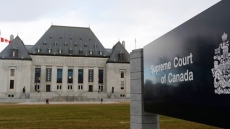VANCOUVER — Former Vancouver Olympics boss John Furlong defamed a journalist when he portrayed her as heartless, cruel and callous, said her lawyer as a heated civil trial drew to a close Friday.
But Furlong's lawyer said his client had a right to defend his reputation after Laura Robinson wrote an "entirely false" article alleging he abused First Nations children at a northern British Columbia school about 45 years ago.
"These are lies. It absolutely didn't happen," John Hunter told a B.C. Supreme Court judge. "That's one of the risks of damaging someone's character — there may be blowback, and it may be strong."
After hearing two weeks of testimony, Justice Catherine Wedge promised to deliver a written decision as soon as possible.
The freelance journalist sued Furlong for allegedly damaging her reputation in several public statements he made after her article was published in September 2012 in the Georgia Straight newspaper.
Her lawyer, Bryan Baynham, said that Robinson carefully investigated the story after receiving a tip and noticing that Furlong's memoir "Patriot Hearts" omitted his past work as a physical education teacher in Burns Lake, B.C., in 1969 and 1970.
He said she sought comment four times through his lawyer, who refused to answer questions, issued a blanket denial and threatened to sue. She obtained affidavits from eight former students who accused Furlong of physical and verbal abuse.
Furlong held a news conference the day the story was published in which he accused her of a "shocking lack of diligence" and a "personal vendetta." He said he was contacted before the 2010 Vancouver Olympics and told that "for a payment it could be made to go away."
Baynham, said Furlong's comments showed a "reckless disregard for truth."
"These actions are not the actions of a man legitimately interested in protecting his reputation," he said.
"Rather, they are a deliberate campaign to discredit the investigative journalist who asked questions, investigated omissions in his narrative and reported accurately on statements and allegations made by First Nations students."
He said Furlong's defence of qualified privilege — meaning he had a right to respond to Robinson's "attacks" — does not apply because he was motivated by malice.
The "most serious" of Furlong's defamatory statements was his suggestion she was linked to an extortion attempt, Baynham said. Furlong has denied implying that Robinson was involved, but Baynham said the former Olympics boss turned down several opportunities to clear the air.
"Mr. Furlong had no interest in setting the record straight," Baynham said.
Hunter acknowledged that Furlong's comments about Robinson's journalistic practices may have been defamatory, but he said they were still protected under his defence of qualified privilege.
He said his client was not motivated by malice, but by the legitimate need to protect his reputation.
Furlong, surrounded by his children and partner Renee Smith-Valade, told reporters outside court that the ordeal has dragged on for years.
"We're exhausted. I'm delighted to be here with my family," he said. "I want to thank them for sticking together and being here and being so supportive and being a terrific family."





